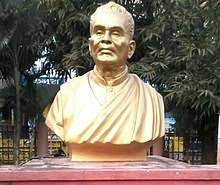Tanguturi Prakasam was the first Chief Minister of Andhra Pradesh. He was a visionary leader and able administrator. His dynamic personality earned him a lasting reputation in the hearts of the Telugu people. He championed Press freedom as a reputed journalist and carried out crucial reforms for the development of Rural people.
- Tanguturi Prakasam was born on 23rd August 1987 to Sri Gopalakrishnayya and Srimati Subbamma. He was born into a middle-class family and spent most of his childhood in his native village, Vinodarayudupalem, in Ongole taluk of then Madras Province. When Tanguturi was twelve years old, his father passed away. The sudden demise of his father left Tanguturi in shock. By 1885, Tanguturi’s family was facing financial difficulties. Owing to these circumstances, Tanguturi and his mother moved to Ongole Town. Tanguturi’s mother ran a small hotel and supported him to study. Tanguturi departed for Rajahmundry, located in Andhra Pradesh, where he successfully passed his Matriculation examination. In 1890, he entered into matrimony with Hanumayamma. Subsequently, he enrolled at Arts College in Rajahmundry and successfully completed the ‘Fellow of Arts program’. In 1892, he relocated to Madras, where he joined the Law College and completed his legal education. After completing his legal studies, he began his career as a pleader. Later, he returned to Rajahmundry, establishing a solid presence as a pleader and actively participating in local politics.In 1904, Tanguturi moved to the United Kingdom to further his legal studies. Upon completing his studies and qualifying as a Barrister, he returned to India in 1907 and commenced legal practice in the Madras High Court. For the ensuing fourteen years until 1921, he continued his dedicated service in the legal profession.
However, Tanguturi’s career started taking a political turn when he began to attend Congress party meetings regularly. After the ‘Surat Split’ in 1907, Tanguturi became an active follower of Congress. Inspired by Mahatma Gandhi, he renounced his profession as an advocate and got wholly involved in politics. On October 29, 1921, he founded ‘Swarajya’, an English daily. He was also the working editor of the publication. Swarajya’s closure came in the year 1936. Later, in 1956, Khasa Subbarao, freedom fighter and journalist, started a magazine with the patronage of C Rajagopalachari and named it “Swarajya” magazine, carrying forward the legacy of Tanguturi Prakasam. Through Swarajya, Tanguturi published Congress’s aims and its blueprint of events. During the Nationalist movement, Swarajya was published in English, Telugu, and Tamil.
During the provincial elections held in 1937, Congress came into power in Madras province. Under the ministry of Shri C Rajagopalachari, Tanguturi worked as the Revenue Minister of Madras. He played a brave role during the ‘Anti-Simon’ agitations in South India. During the Anti- Simon protests, Tanguturi faced the armed police, tore his shirt bared his chest and dared them to shoot. Due to his brave act of defiance, he was called “Andhra Kesari”. In 1946, he became the Chief Minister of Madras province. He remained in office for eleven months and later relinquished his post.
Apart from his political achievements, his liberal outlook towards press freedom was remarkable. The Library movement started in India in 1910 and played a significant role in promoting literacy, education, and dissemination of knowledge throughout the country. The Andhra Library movement began in 1914, and Tanguturi actively attended the Andhra Library conferences. He suggested establishing printing presses to spread the library movement. He contributed significantly to publications like Madras Law Times, Praja Patrika, and Swarajya.
Tanguturi was passionate about introducing village libraries to promote literacy and knowledge among the rural folk. He firmly believed that Journalism and the Library Movement could be used for education and the political awareness of the masses.
Tanguturi immensely contributed to the social development of Andhra Pradesh. After several years of agitation, the Andhra State was formed in 1953. Tanguturi became the first chief minister of the newly formed state. As a visionary leader, he understood the importance of educating the masses. He believed everyone must have access to education irrespective of caste, creed, religion, and gender. To cater to the educational needs of the people in the Rayalaseema region of Andhra, Tanguturi founded Sri Venkateshwara University in 1954 at Tirupati.
He also laid great emphasis on rural development. Inspired by Mahatma Gandhi, Tanguturi pioneered reforms to uplift Dalits, handloom workers, and downtrodden sections of society. He believed that villages must be formed based on self-sufficiency and self-governance. He was appointed Chairman of the “Zamindari Enquiry Committee” in Madras. Under his guidance, the committee prepared a report which became the precursor of the Government’s efforts to abolish the Zamindari system in the country.
In the early 1950s, Tanguturi came up with the Firka development concept for rural development. The prime objectives of this concept were to improve the standard of living of the rural folk and to develop the rural economy through self-employment and community building. This concept was implemented in Madras presidency and focused on several areas, including agriculture, rural infrastructure and cottage Industries. Firka development concept was successful as it brought positive changes to the lives of rural people in Madras presidency. It became a vanguard of the community development programme launched throughout India in 1952.
Tanguturi Prakasam inspired a generation of leaders as a role model politician of all times. His dauntless courage and bravery during Anti- Simon movement brought him widespread admiration. He had a multifaceted personality. He was a valiant freedom fighter for the nation, a distinguished editor of Swarajya, and an able administrator of Andhra Pradesh. With a liberal outlook towards rural development, Tanguturi always remained an idol of the masses.
References
- Proud Moment For Swarajya: University Named After First AP CM And Publication’s Original Founder Prakasham Panthulu (swarajyamag.com)
- T. Prakasam – Constitution of India
- Tanguturi Prakasam’s Role in the Library Movement | INDIAN CULTURE
- Tanguturi Prakasham (amritmahotsav.nic.in)
- Tanguturi Prakasham Pantulu (amritmahotsav.nic.in)
Previous musing: KANDUKURI VEERESALINGAM: ICON OF ANDHRA’S RENAISSANCE


